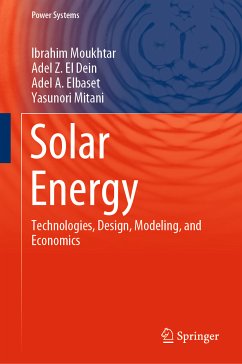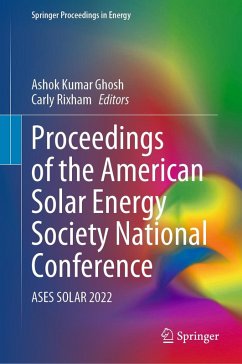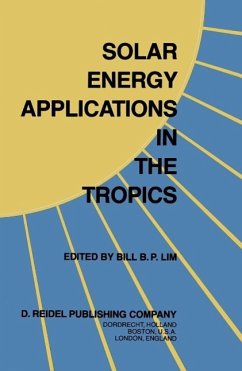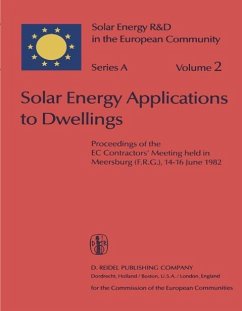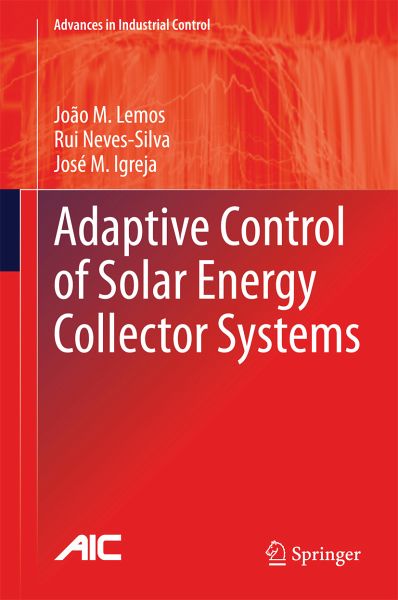
Adaptive Control of Solar Energy Collector Systems (eBook, PDF)
Versandkostenfrei!
Sofort per Download lieferbar
72,95 €
inkl. MwSt.
Weitere Ausgaben:

PAYBACK Punkte
36 °P sammeln!
This book describes methods for adaptive control of distributed-collector solar fields: plants that collect solar energy and deliver it in thermal form. Controller design methods are presented that can overcome difficulties found in these type of plants:they are distributed-parameter systems, i.e., systems with dynamics that depend on space as well as time;their dynamics is nonlinear, with a bilinear structure;there is a significant level of uncertainty in plant knowledge.Adaptive methods form the focus of the text because of the degree of uncertainty in the knowledge of plant dynamics. Parts ...
This book describes methods for adaptive control of distributed-collector solar fields: plants that collect solar energy and deliver it in thermal form. Controller design methods are presented that can overcome difficulties found in these type of plants:
Adaptive methods form the focus of the text because of the degree of uncertainty in the knowledge of plant dynamics. Parts of the text are devoted to design methods that assume only a very limited knowledge about the plant. Other parts detail methods that rely on knowledge of the dominant plant structure. These methods are more plant specific, but allow the improvement of performance.
Adaptive Control of Solar Energy Collector Systems demonstrates the dynamics of solar fields to be rich enough to present a challenge to the control designer while, at the same time, simple enough to allow analytic work to be done, providing case studies on dynamics and nonlinear control design in a simple and revealing, but nontrivial way.
The control approaches treated in this monograph can be generalized to apply to other plants modelled by hyperbolic partial differential equations, especially process plants in which transport phenomena occur, plants like dryers, steam super-heaters and even highway traffic.
An important example, used repeatedly throughout the text, is a distributed-collector solar field installed at Plataforma Solar de Almeria, located in southern Spain. The control algorithms laid out in the text are illustrated with experimental results generated from this plant.
Although the primary focus of this monograph is solar energy collector, the range of other systems which can benefit from the methods described will makeit of interest to control engineers working in many industries as well as to academic control researchers interested in adaptive control and its applications.
- they are distributed-parameter systems, i.e., systems with dynamics that depend on space as well as time;
- their dynamics is nonlinear, with a bilinear structure;
- there is a significant level of uncertainty in plant knowledge.
Adaptive methods form the focus of the text because of the degree of uncertainty in the knowledge of plant dynamics. Parts of the text are devoted to design methods that assume only a very limited knowledge about the plant. Other parts detail methods that rely on knowledge of the dominant plant structure. These methods are more plant specific, but allow the improvement of performance.
Adaptive Control of Solar Energy Collector Systems demonstrates the dynamics of solar fields to be rich enough to present a challenge to the control designer while, at the same time, simple enough to allow analytic work to be done, providing case studies on dynamics and nonlinear control design in a simple and revealing, but nontrivial way.
The control approaches treated in this monograph can be generalized to apply to other plants modelled by hyperbolic partial differential equations, especially process plants in which transport phenomena occur, plants like dryers, steam super-heaters and even highway traffic.
An important example, used repeatedly throughout the text, is a distributed-collector solar field installed at Plataforma Solar de Almeria, located in southern Spain. The control algorithms laid out in the text are illustrated with experimental results generated from this plant.
Although the primary focus of this monograph is solar energy collector, the range of other systems which can benefit from the methods described will makeit of interest to control engineers working in many industries as well as to academic control researchers interested in adaptive control and its applications.
Dieser Download kann aus rechtlichen Gründen nur mit Rechnungsadresse in A, B, BG, CY, CZ, D, DK, EW, E, FIN, F, GR, HR, H, IRL, I, LT, L, LR, M, NL, PL, P, R, S, SLO, SK ausgeliefert werden.




